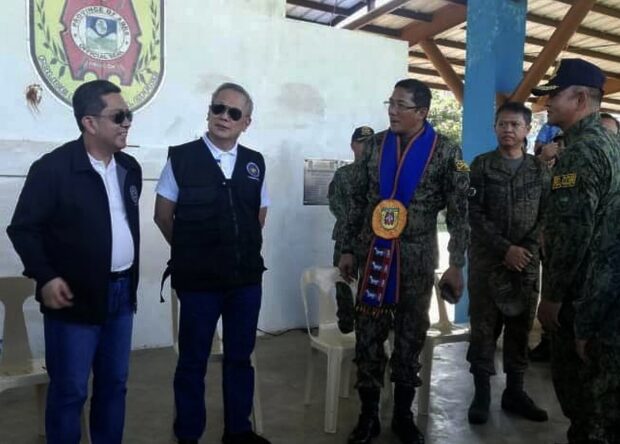
BRIEFING Commission on Elections Chair George Garcia (left) and Philippine National Police chief Gen. Benjamin Acorda Jr. are given a briefing in Abra province on Sunday, a closely watched area for Monday’s barangay and youth polls. —PHILIPPINE INFORMATION AGENCY
COTABATO CITY—Despite the torching of at least two schools in Maguindanao del Norte and Lanao del Norte provinces on the eve of the barangay and Sangguniang Kabataan elections, the balloting will still push through in these areas on Monday, the Commission on Elections (Comelec) ruled.
Comelec Chair George Garcia said unidentified men had set ablaze the school building in Barangay Rumirimbang, Barira town of Maguindanao del Norte at 2 a.m. on Saturday while a similar incident also occurred in Poona Piagapo town of Lanao del Norte at 4 a.m.
In the torched school building in Barangay Rumirimbang, at least six voting precincts were affected and the balloting had to be relocated within the same campus, Comelec officials said.
The affected precincts in Poona Piagapo will be transferred elsewhere, Comelec said.
Police Brig. Gen. Allan Nobleza, police director of the Bangsamoro Autonomous Region in Muslim Mindanao (BARMM), revealed there was also an attempt to burn Dalican Elementary School in Datu Odin Sinsuat town, also in Maguindanao del Norte, but the fire was immediately put out by firefighters.
Also in Datu Odin Sinsuat’s village of Ambolodto, gunfire broke out at the dawn hours of Saturday, prompting 300 villagers to flee their homes for safety.
Election-related
Nobleza said the burning of Barira’s five-classroom school and the attempt to burn another school in Datu Odin Sinsuat were both election-related, brought about by intense rivalry among aspirants for barangay posts.
“There were pieces of evidence showing that these [incidents] were intentional and were aimed to disrupt Monday’s elections,” Nobleza said in a news conference on Sunday.
Both villages had been categorized as “red category” barangays or areas with grave security concerns due to intense political rivalry.
Nobleza said more than 8,800 police officers, including 1,900 augmentation forces, had been deployed across BARMM to secure the elections, including some 2,000 personnel trained to serve as special electoral board members in precincts where teachers had backed out due to security concerns.
On Friday, tensions also rose in Talitay town of Maguindanao del Norte when the armed followers of Mayor Sidik Ameril of Talitay reportedly clashed with members of the Moro Islamic Liberation Front (MILF) near the mayor’s home.
Three civilians were wounded in the incident, said Ameril, who told reporters he was puzzled why they were targeted by the MILF. There was no word from the MILF leadership yet on the incident.
CurfewIn Ilocos Norte, Gov. Matthew Marcos Manotoc on Sunday imposed a province-wide curfew—from 10 p.m. on Sunday to 4 a.m. on Election Day—after the provincial police received reports on “actual physical violence and reported armed groups in various areas in the province” ahead of the elections.
Manotoc, in an executive order, said the curfew was also meant to deter rampant vote-buying and vote-selling efforts, and support the liquor ban imposed by Comelec.
Exempted from the curfew were Comelec personnel, law enforcers, health workers, private individuals traveling on emergency and essential establishments like hospitals, pharmacies, food houses and call centers.
Lawyer Julius Harvey Balbas, election officer of the capital city Laoag, said in a text message that there was no need for Comelec to approve the imposition of the curfew, as it could be done by the provincial government with the general welfare clause of the Local Government Code as its basis.
In Ilocos Sur, police on Sunday said they were investigating as possibly election-related the shooting and wounding on Saturday in Butol village of Santiago town of an incumbent village chief and his daughter.
The Ilocos regional police said it had deployed over 8,000 personnel to safeguard all voting centers in the region on Monday.
Early delivery
In the Cordillera, ballots were delivered on Sunday to 196 far-flung communities in the provinces of Abra, Ifugao, Kalinga, Benguet, Apayao and Mountain Province ahead of Monday’s elections.
Comelec prioritized the early delivery of ballots to the said areas in order to give time for their personnel and police who need to hike the steep, mountainous terrain to perform their duty.
The police and Comelec electoral boards also brought ballots to 59 villages that are accessible by motorcycles and 11 villages in Abra, Apayao and Ifugao that can be accessed by river boats.
In Benguet, the police escorted ballots to remote communities in vegetable producing towns of Kabayan near Mt. Pulag, Kapangan, Kibungan and Bakun; and the mining town of Mankayan, where roads were too rugged for conventional vehicles, said provincial election supervisor Elenita Tabangin on Sunday.
Also on Sunday, Garcia and Philippine National Police chief Gen. Benjamin Acorda Jr. inspected the security preparations in Abra, mainly the communities where violence had been recorded during the election period.
Acorda and Garcia, while in the capital town of Bangued, were briefed about the province’s 48 areas of concern or hot spots.
In Central Luzon and Calabarzon (Cavite, Laguna, Batangas, Rizal and Quezon) regions, at least 19,000 police officers had been deployed to take on election duties.
Visayas
In the Visayas, Comelec had identified 587 villages as areas of concern—391 in Eastern Visayas, 172 in Western Visayas and 24 in Central Visayas.
On top of the closely watched areas in the Visayas is Negros Oriental, the lone province in the country placed under Comelec control to ensure safe elections in the wake of the murder last March of Gov. Roel Degamo and nine other persons.
Lt. Col. Gerard Ace Pelare, spokesperson of the Central Visayas Joint Security Coordinating Center, said some 15,100 Comelec checkpoints had been established in the region since the beginning of the election period and the imposition of the gun ban on Aug. 28.